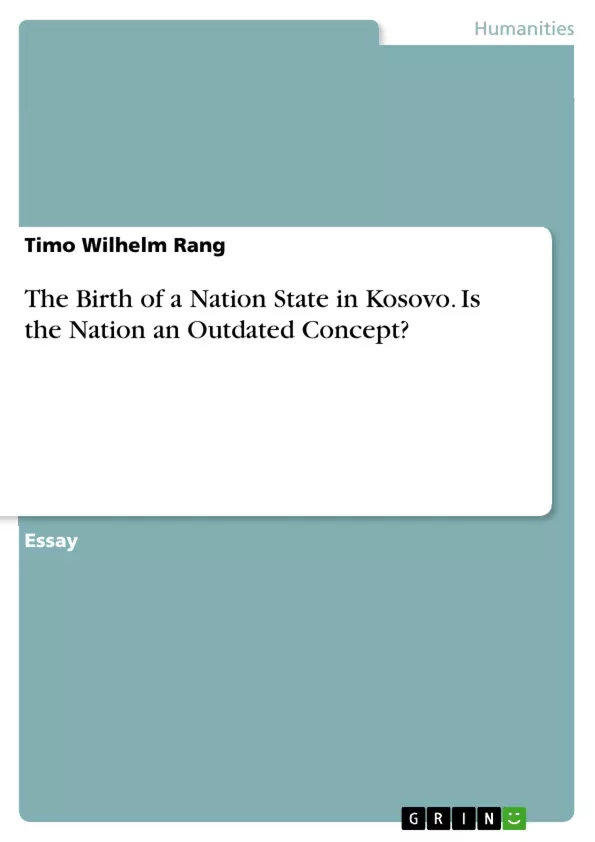On the following pages I will try to point out the key role nations still play today. What one associates with a nation forms the national identity which is – for many maybe subconsciously – a crucial element of the individual identity. In my opinion nations will always strive for nation states as they guarantee most reliably the protection of national and therefore personal interests such as cultural determination, security, political self-determination and financial and economic prospect.
Kosovo is a recent example where the ‘denationalisation’ described in the paragraph above seems to be inversed. The former Yugoslavian province has become Europe’s youngest state, not only chronologically but also demographically. What motivates this young generation to stand in for a nation that has so little to offer to them? I will deal with the two sides of nationalism and describe how a moderate sense of nationality radicalised and drove the Balkans into the Kosovo crisis. Despite the negative consequences overreaching nationalism can bring about I will talk about the necessity of national identities and explain why the nation is not an outdated concept.
Inhaltsverzeichnis (Table of Contents)
- Introduction
- The Nation - A Cultural Studies Approach
- The Need for a National Identity
- The Nation - An outdated Concept?
- Kosovo: The Birth of a Nation State
- Background Information: Kosovo
- The Independence of Kosovo
- Conclusion
Zielsetzung und Themenschwerpunkte (Objectives and Key Themes)
This text aims to explore the concept of national identity in a globalized world, arguing that nations, despite the challenges they face, continue to hold a crucial role in individual and collective identity. It examines the case of Kosovo, a newly established nation state, to illustrate the contemporary relevance of national identity and the complex dynamics of nationalism. The text emphasizes the following key themes:- The enduring significance of national identity in a globalized world.
- The role of nations in providing a sense of belonging and stability in an increasingly complex and uncertain world.
- The potential pitfalls of nationalism and the need for a balanced approach to national identity.
- The case of Kosovo as an example of the contemporary quest for nationhood and its potential consequences.
- The relationship between national identity and individual identity.
Zusammenfassung der Kapitel (Chapter Summaries)
The Introduction begins by exploring the historical context of national identity, citing the views of prominent thinkers like Heinrich Heine and Karl Marx, who questioned the long-term viability of nation states in a globalized world. It argues that despite the increasing influence of supra-national institutions and global economic forces, national identities remain relevant and influential.
Chapter 2, "The Nation - A Cultural Studies Approach," delves into the need for national identity in the contemporary context, examining the challenges and opportunities posed by globalization, multiculturalism, and social and cultural uprooting. It posits that national identity provides a sense of belonging and stability, particularly for migrant communities and in times of rapid social change.
The second part of Chapter 2, "The Nation - An outdated Concept?", challenges the notion that nation states are an antiquated concept. It argues that nations remain relevant and influential, particularly as they provide a framework for social and cultural cohesion. The chapter concludes by acknowledging the potential for nationalism to be misused and the need for a balanced approach.
Chapter 3, "Kosovo: The Birth of a Nation State," examines the case of Kosovo, analyzing the background information and the factors that led to the declaration of independence. It explores the complexities of nationalism, including its potential for both positive and negative consequences, and the importance of responsible and moderate nationalism.
Schlüsselwörter (Keywords)
The main keywords and focus topics of this text include national identity, globalization, nationalism, nation-state, multiculturalism, Kosovo, and the contemporary relevance of national identity. These concepts are explored in the context of the evolving relationship between individual and collective identities in a rapidly changing world.Frequently Asked Questions
Is the concept of a 'nation' outdated in a globalized world?
No, the text argues that nations remain crucial as they provide identity, security, and political self-determination that global institutions cannot fully replace.
What is the significance of Kosovo's independence?
Kosovo is a modern example of the birth of a nation-state, showing that even young generations still value national identity and sovereignty.
How does national identity relate to individual identity?
National identity is often a crucial, sometimes subconscious, element of an individual's identity, providing a sense of belonging and stability.
What are the potential dangers of nationalism?
Overreaching or radicalized nationalism can lead to crises and conflict, as seen in the history of the Balkans and the Kosovo crisis.
What role does globalization play in national identity?
Globalization creates social and cultural uprooting, which can actually increase the need for the stability provided by a national identity.
Why do nations strive for their own states?
Nation-states are seen as the most reliable way to guarantee personal interests like cultural determination, security, and economic prospects.
- Citation du texte
- Timo Wilhelm Rang (Auteur), 2008, The Birth of a Nation State in Kosovo. Is the Nation an Outdated Concept?, Munich, GRIN Verlag, https://www.grin.com/document/125879



